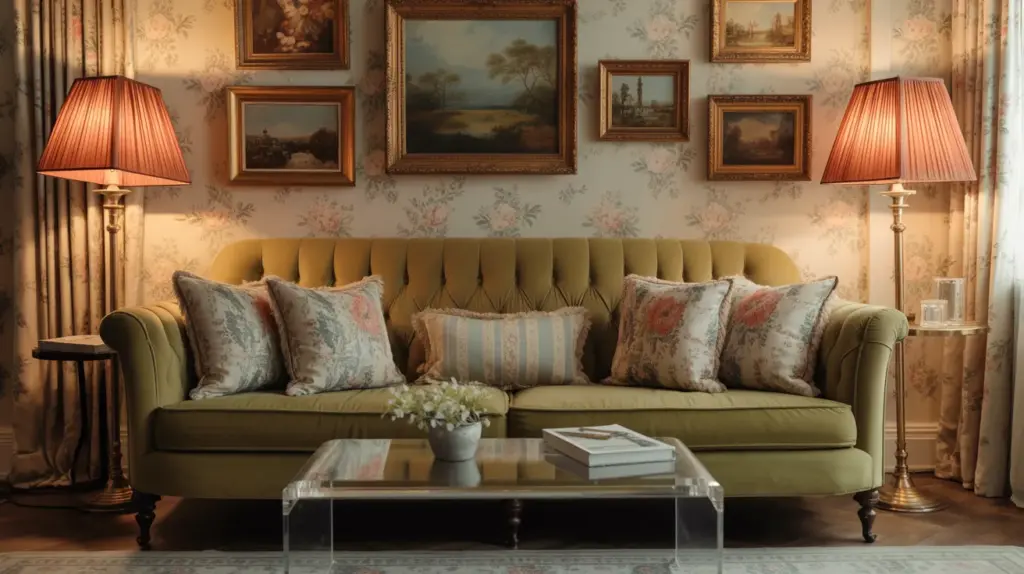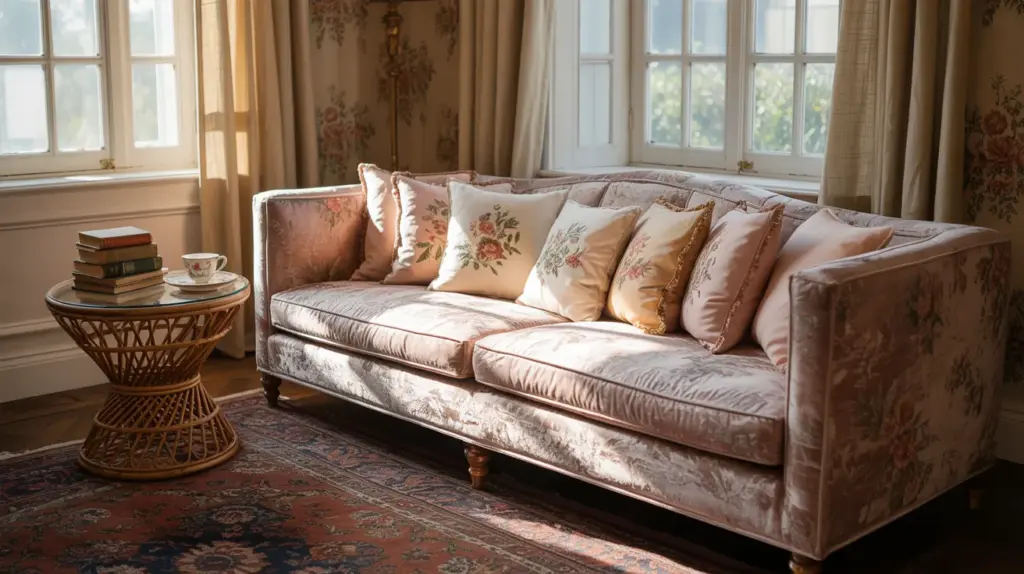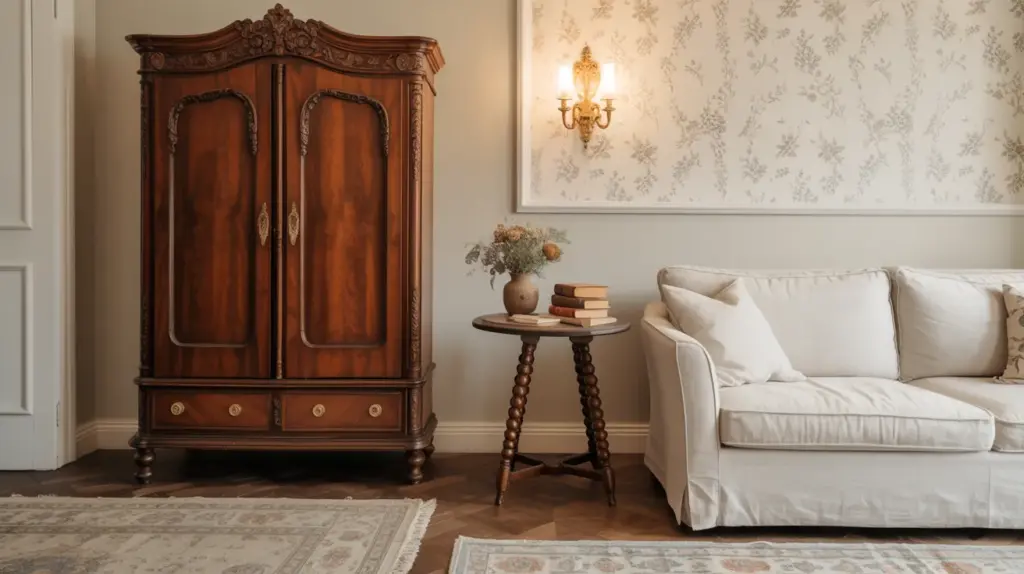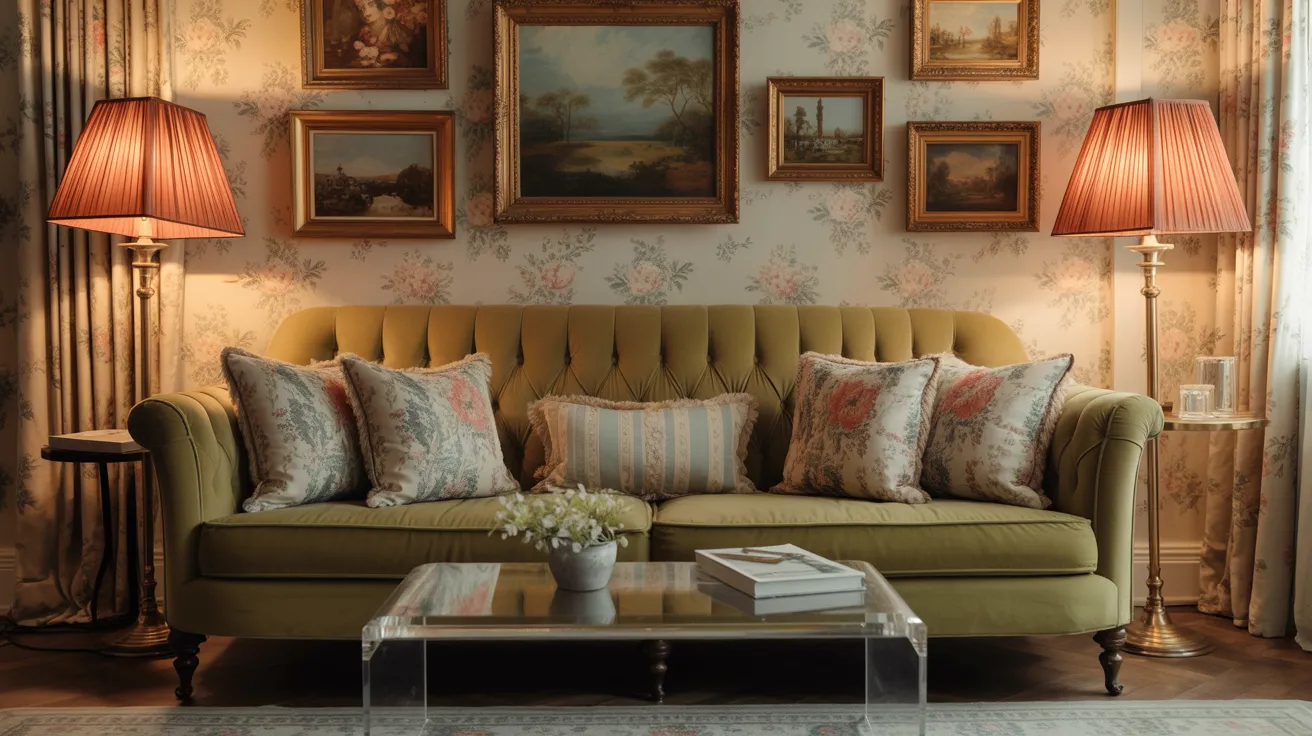Traditional Grandmillennial Living Room Ideas with a Modern Twist for Timeless Charm
Table of Contents
Introduction
What do you get when you mix your grandmother’s heirloom china with clean-lined furniture and a curated aesthetic? The answer lies in the grandmillennial style—a rising home decor trend that celebrates traditional design through a youthful, modern lens.
More than just a nostalgic nod to floral chintz and antique furniture, the grandmillennial movement is all about honoring timeless elegance while embracing the clarity and freshness of contemporary living. According to Pinterest’s Home Trends Report, searches for “grandmillennial decor” have surged by over 300% in the past two years, with younger homeowners gravitating toward its cozy-meets-classic appeal.
This blog post explores how to craft a traditional grandmillennial living room with a modern twist, offering a sophisticated balance of old and new. From choosing the right patterns and textiles to layering decor elements and incorporating updated furniture silhouettes, you’ll find actionable design insights, style inspiration, and layout tips to transform your space.
Whether you’re refreshing a historic home or bringing character to a new apartment, these ideas will help you achieve that perfectly imperfect, collected-over-time look that defines grandmillennial charm—with just enough modern edge to keep it fresh.
The Essence of Grandmillennial Style in a Living Room
To master a traditional grandmillennial living room, it’s important to understand what defines the style at its core. Grandmillennial design is rooted in comfort, heritage, and intentional layering—blending the warmth of bygone eras with a personalized, youthful update.
Think patterned wallpaper, pleated lampshades, scalloped edges, and embroidered throw pillows. But rather than feeling stuffy, these elements are styled with a modern eye. A velvet camelback sofa may be paired with a clean-lined acrylic coffee table, or a delicate floral wallpaper set off by sleek matte black sconces.
Balance is key. Too much traditional can feel heavy, while too much modern can lose the cozy charm. Instead, choose classic pieces with a pop of color, or pair vintage elements with contemporary scale and finish.
Key Style Traits: Grandmillennial Living Room
| Traditional Elements | Modern Twists |
| Skirted furniture | Minimalist upholstery fabric |
| Antique frames and oil paintings | Streamlined gallery walls |
| Chintz and toile fabrics | Mixed with linen or boucle textures |
| Blue-and-white porcelain | Styled on floating shelves |

Choosing the Right Color Palette for Classic Yet Current Appeal
Color plays a vital role in grounding the grandmillennial style. Traditional spaces often favor dusty pastels, antique white, and deep jewel tones, while modern decor trends embrace lighter, more neutral tones. The perfect blend lies somewhere in between.
A good place to start is with a soft neutral foundation: think warm cream, soft sage, or muted blush. From there, layer in richer shades like navy, maroon, forest green, or powder blue—colors reminiscent of English countryside homes and Southern parlors.
To modernize the space, balance these classic tones with contrasting finishes. A navy accent wall might pair beautifully with a sleek white sofa or brushed gold hardware. You can also ground busier color palettes with clean lines and negative space.
Color Scheme Tips for Grandmillennial Living Rooms
| Base Neutrals | Accent Colors | Modern Touches |
| Warm beige | Dusty rose, jade green | Matte black, brushed brass |
| Cream or ivory | Navy, periwinkle | Clear acrylic, sleek chrome |
| Soft sage or olive | Terracotta, mustard yellow | Natural oak or walnut wood |
Layering Fabrics and Textures for a Cozy Vintage Look
Layering is the secret to the cozy elegance of grandmillennial style. Combining varied fabrics, trims, and textures gives the room a curated and welcoming look that feels both collected and intentional.
Begin with an upholstered piece—like a tufted sofa or a rolled-arm armchair—and build around it with throw pillows in floral or damask prints. Pair these with ruffled linen drapes, crocheted blankets, or fringed footstools. Don’t be afraid to mix textures: velvet with wicker, lace with leather, linen with brass.
What makes the layering feel modern is restraint and editing. Instead of overcrowding the space, focus on a few impactful textiles and materials and repeat them thoughtfully throughout the room. Grandmillennial style thrives on emotional warmth, not maximalism for its own sake.
Checklist: Textiles and Textures for Grandmillennial Layering
| Texture Type | Example Use | Style Tip |
| Velvet | Accent chairs, throw pillows | Add visual richness |
| Linen | Drapes, slipcovers | Creates softness and light |
| Embroidery | Pillows, framed textiles | Adds a handcrafted touch |
| Rattan or cane | Accent furniture, baskets | Introduces natural warmth |

Blending Antique Finds with Contemporary Furniture
One of the defining features of grandmillennial design is the blending of eras—bringing heirloom-quality pieces into conversation with present-day simplicity. The trick is to create harmony between ornate and clean silhouettes.
Start with one vintage anchor piece. It could be a carved wooden armoire, a spindle-leg coffee table, or a pair of antique wingback chairs. Then introduce modern counterpoints—like a low-slung sectional, a streamlined media console, or minimalist lighting.
Pay attention to proportion. Vintage furniture can sometimes feel heavier, so balance it out with visually light pieces such as glass, metal, or open-frame furniture. Use complementary tones—like mixing dark wood with soft cream upholstery—to keep the look cohesive.
When styled correctly, the result is a space that feels storied and refined, yet still fresh and livable.
Blending Vintage and Modern: Do’s and Don’ts
| Do | Don’t |
| Mix periods but unify with color palette | Overcrowd with heavy antique pieces |
| Keep modern lines clean and simple | Use clashing wood tones everywhere |
| Let vintage pieces serve as focal points | Hide antiques under too many accessories |
| Style antiques with fresh accents | Overstyle with old-world clutter |

.
Decorating with Sentimental Accents and Personality Pieces
Grandmillennial spaces aren’t just about aesthetics—they’re deeply personal. This style encourages meaningful design choices rooted in nostalgia, memory, and charm. Think framed needlepoint from a grandmother, a tea set from childhood, or a curated shelf of hardcover classics.
Mixing in personal artifacts gives a lived-in quality to your space. Display them with intention: hang inherited wall art in modern frames, or place vintage figurines on updated acrylic shelves.
Books are especially welcome in a grandmillennial room. Stack them on side tables, arrange them in rainbow color order on built-in bookshelves, or scatter them under floral lamps. Trinket trays, vintage mirrors, and handmade items all add depth.
The trick is to balance visual interest with breathing room. Allow your sentimental pieces to shine by giving them space and purpose.
Table: Ways to Showcase Personality in Grandmillennial Decor
| Personal Accent | Where to Use It | Modern Styling Tip |
| Vintage tea set | Displayed on open shelves | Pair with matte white ceramics |
| Family needlepoint art | Framed in minimalist black frame | Create a gallery wall moment |
| Hardcover vintage books | Stacked on console or ottoman tray | Top with small vase or sculpture |
| Antique photo frames | Mixed in with modern decor pieces | Keep arrangement clean and simple |
Conclusion
The charm of a traditional grandmillennial living room with a modern twist lies in its rich contrasts—old meets new, ornate meets streamlined, memory meets minimalism. By thoughtfully blending vintage finds, updated furniture, sentimental accents, and cozy textiles, you can create a space that feels both nostalgic and fresh.
This is a style that celebrates personal stories as much as it celebrates design. It invites you to revisit the past, rethink your present, and create a home that feels timeless, tailored, and truly yours.

